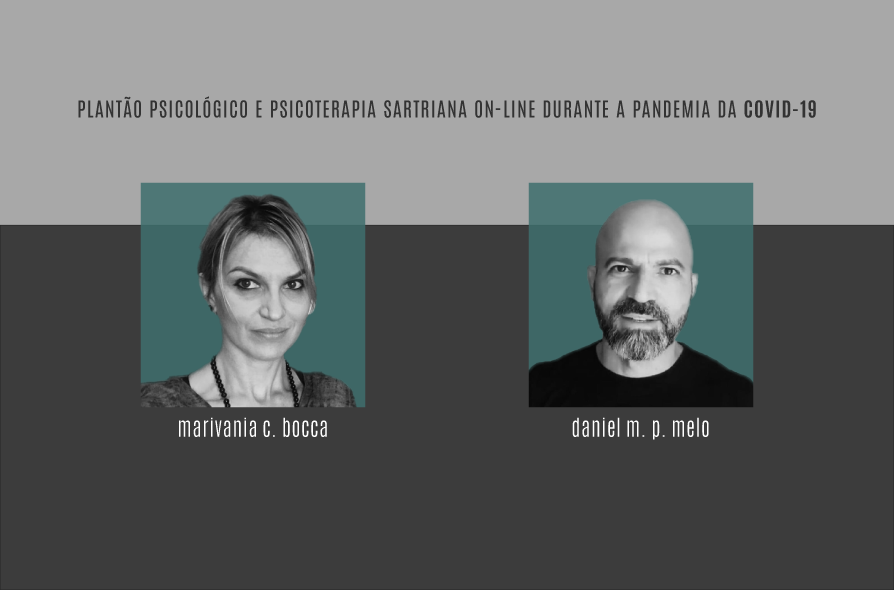16 April 2020 Psychological duty and online Sartrean psychotherapy during the covid-19 pandemic

by Daniel Márcio Pereira Melo and Marivania Cristina Bocca
The great health crisis (emergency) that the world has been experiencing in recent months due to the terrible scenario imposed by the Covid-19 pandemic has been impacting, in an incessant and distressing way, people’s speeches, emotions, and actions. The world is in quarantine. Health authorities, including the World Health Organization – WHO, advises us not to leave our homes. They warn us of the physical, social, economic, and psychological damage that the coronavirus might cause. They also warn us of the higher lethality rate among people who are part of risk groups (people over 60 and people with pre-existing health problems). However, we are all subject to becoming infected. Therefore, there are many attitude changes which have been imposed on us by the pandemic.
With the growing evolution of the number of people infected with the coronavirus in Brazil, it became necessary that the psychological clinical practice also went through a process of change. For a better contextualization about this change, let us look back. Since 2018, more precisely by Resolution number 11, of May 2018, the Federal Council of Psychology – CFP – regulated the provision of psychological services carried out through information and communication technologies, authorizing psychologists duly registered on the e-Psi for such a practice. It so happens that, since the first confirmed cases of contamination by the coronavirus in Brazil, in order to minimize the impacts regarding the psychophysical-social and economic suffering caused by the pandemic, especially due to the isolation, the CFP has temporarily adopted another type of measure. The action taken by the Council, during the pandemic, aims to facilitate access to online services.
In a note, on March 16, 2020, the CFP reported:
According to the recommendations of the Ministry of Health, the World Health Organization (WHO), the Health Secretariats, and civil authorities on possible possibilities for quarantine, protection and isolation in order to prevent the spread of the Covid-19 pandemic, the new coronavirus, the Psychology Council System communicates to the category that professionals who choose to provide psychological services carried out by means of information and communication technology, such as online service, must register through the “Cadastro e-Psi” website […]. However, temporarily for the months of March and April, it will not be necessary to wait for confirmation from the platform to begin remote work (CFP, 2020).
With this measure, the CFP opened the possibility for a greater number of psychologists to have their appointments in the online format. This clearly has an impact that goes much further than the number of appointments. There are many psychologists, from the most diverse theoretical and methodological orientations, who are adhering to this type of assistance. Including those who adopted a more resistant posture to such praxis. Everyone, in their most diverse interests, is discussing and theoretically justifying this ‘new’ possibility of clinical performance.
Therefore, with this text, we aim to point out the aspects relevant to the provision of psychological services through information and communication technologies, more specifically, through the modality of psychological duty and online psychotherapy. The theoretical-methodological foundations used for this come from the Sartrean phenomenological psychology. We present reflections on our experiences as psychotherapists working with the online psychotherapy modality in Brazil. We start from the premise of the French philosopher Jean-Paul Sartre (1943/2005), that the clinical psychological practice cannot do without history, because it is in history that the person becomes the person he or she is. Therefore, it is not for diagnosis that psychotherapy is done in a Sartrean perspective. Nor is there a clinic in psychology pursued by a treatment model. In psychotherapy, history is told and stories are made up! Therefore, the clinic needs to resume having the story’s narrative as a basic premise. This narrative takes form and place, solely and exclusively, in the intersubjective dynamics that happens between the psychologist and the client/patient/person in care.
It is in the existing performance in the encounter between the two characters in the service scene, in this case virtual, that we find what is sufficient and necessary for clinical psychological care. With that we are not declaring war on the diagnosis, nor do we disregard it. All elements historically defended in clinical practice, such as: diagnosis, treatment, symptom, and technique are important. However, in a Sartrean-existential view, the crucial point is the historical, the vecu (lived). That is what reveals a person’s project of being (SARTRE, 1943/2005).
From the practice of psychological duty and online psychotherapy to legal and ethical aspects
With the advance of the pandemic by Covid-19 directly and indirectly affecting the most varied areas of the contemporary man’s life, there are many doubts that are revealed in the form of questions by some clinical psychologists who have never acted from the on-line care modality. The doubts are pertinent and necessary to the working of the professionals who face this new praxis in such state of emergency, as is the moment of the pandemic that we currently face.
Faced with such doubts, it is necessary to resume a guiding question for online clinical practice: What psychological services are authorized by the Resolution – CFP, of 11 May 2018? Let us revisit the resolution itself, which, in its article 2nd clarifies: “The provision of the following psychological services carried out by technological means of information and communication are authorized, provided that the provisions of the Code of Professional Ethics of the psychologist do not hurt this Resolution”.
I – Consultations and/or psychological appointments of different types in a synchronous or asynchronous manner; II – Personnel Selection processes; III – Use of psychological instruments duly regulated by the relevant resolution, and psychological tests must have a favorable opinion from the Psychological Instruments Assessment System (SATEPSI), with specific standardization and regulations for this purpose; IV – Technical supervision of services provided by psychologists in the most diverse contexts of activity. (CFP, 2018)
Still according to Resolution CFP No. 11/2018, regardless of the type of service provided, psychology professionals are obliged to “[…] specify the technological resources used to guarantee the confidentiality of information and to clarify the client about it” (Resolution CFP No. 11, Article 2, § 2, 2018). Thus, we can say that the norm evokes an ethical dimension that needs to be discussed within the online psychological care modality. Such discussion about this ethical dimension needs, for example, to reach the professional’s own appropriation process of the ethical aspects of his or her professional praxis. Basic questions for clinical practice need to be reprised and taken into account for practice with the duty and/or online psychotherapy: the choice of an approach; the commitment to secrecy; the formulation of a therapeutic contract, among others. Thus, it is important that the professional who intends to offer clinical services in the online modality has a commitment to understand how his or her specific theoretical approach deals with the theme; understand clearly what the procedure is about – online psychological care; understand clearly the necessary principles for a contract in this type of modality.
Practical aspects for setting up online psychological care
The dynamics of psychological care in the online modality makes us think about the elements of the process, namely: the place of the psychologist, that of the client/patient/person in care, the relationship established, the place where the online meeting takes place, the time of the meeting and the connection/disconnection. Aiming at a theoretical-methodological proposal based on the Sartrean approach to an online psychological care praxis, we use the expression ‘framing’ in the sense of setting up our work. To do so, we approach two types of frameworks, namely: 1) situational-relational and 2) temporal. With this configuration, the psychologist will contribute so that the person in care can enter the process of virtual psychological care, as well as for the establishment of the link between them. Let us see:
1) Regarding the situational-relational framework, in the practice of online existential-Sartrean psychological care, the psychologist must maximize the awareness of the client/patient/person in care about the (new) socio-historical, physical/sanitary (out of fear of becoming ill and/or dying from the coronavirus, from the respiratory label to the isolation) and economic situation, as well as the psychological status in which they find themselves.
The psychologist announces the beginning of psychological care, be it on duty call, or in psychotherapy, which consists of a specific configuration, that is, the online (virtual) configuration. Such clarification should be made by pointing out in what configuration and with what quality of image, sound, and connection the meeting is taking place. In addition to the elements that make up the configuration of the screen (image, sound, connection, and others), it is necessary that both psychologist and client/patient/person in care, mention in which physical space/place (home, office, workplace, public place, automobile or other) they are establishing such an online meeting/connection and whether there are other people in these spaces/locations. These elements are important and must be present in the establishment of the employment contract aiming that the meeting can be secure and confidential. They are, among others, the elements that can go through the experience of being present in this possibility of online service. It is worth mentioning that other guiding principles for establishing the therapeutic contract in the face-to-face modality should also be used in the online (virtual) modality.
At the time of framing, the psychologist makes use of the “progressive-regressive” movement (SARTRE, 1960/2002) constant during a clinical process via a Sartrean approach, starting from the very impressions of what is seen and/or heard on the “experience screen” of their client/patient/person in care – we call the experience screen everything that comes from the client/patient to the therapist via the device used for the session. The psychologist must also come back to himself, as a person who is sharing that experience, presenting the impressions about his or her own feelings, as well as how they show themselves. This posture will make the client/patient, little by little, also enter into the same movement and rhythm and will donate the necessary clinical-phenomenological data for the unveiling of their experience and the construction of the meaning of their project of being. It is important to highlight here that it is the understanding of the project of being the main objective of a Sartrean clinical investigation (SARTRE, 1943/2005).
2) As for the temporal frame, this will be handled through factual elements. We point out here at least four of these elements: a) the session time (which can be performed by video or audio); b) the time of the connection (since now, at least in Brazil, in times of house isolation, people are using the means of online communication a lot, with an overload on the internet, which sometimes proves to be slow or disconnected); c) the listening time; d) the time of the experience. Such elements are pointed out as necessary for handling the experience of temporality in an existential-Sartrean practice of online service.
It is important to discuss how the experience of temporality and spatiality is being felt in this pandemic moment with the quarantine imposed. It seems that there is an aggravation of anxiety, depression, phobias, and psychic disorders. Such frameworks cannot be neglected and they need to be discussed, in due time and space, in the light of the empirical and theoretical data to which each professional has access. For now, it is salutary to indicate that the professional tries to identify how such pictures are manifested before the experience of temporality and spatiality lived by the person in quarantine and conducts the treatment in a way to give direction to such issues.
Let us look at each of the elements that make up the temporal frame which is proposed here:
a) Regarding the time of the session: the time that the psychologist has available for appointments must be agreed on, while taking into account the need/demand of the client/patient/person in care. In general, the sessions follow the usual time pattern: between fifty minutes to an hour for each session. It is important to highlight that, because it is a virtual meeting, the experience of temporality is supported differently by each person. Therefore, it is suggested that the professional has sensitivity to understand what would be an appropriate session time to have with the person who is under care.
b) Regarding the time of the connection, sometimes it is revealed in its fluidity, sometimes in a way to tear or transgress the very contact established between psychologist and the person under care, for example, when the connection is interrupted. The consciences present in such an encounter, client/patient and psychologist, also need to position themselves in this context. The psychologist, on behalf of conducting the process, must make use of this element as a therapeutic management tool.
c) Regarding the listening time, if in face-to-face psychotherapy, we sometimes deliver the client to his or her own speech, handling it, for example, with the support of (productive) silence, in an online psychotherapy session, listening needs to assume its very own dynamic. It seems to be preferable, instead of leaving/abandoning the client to a fluid speech, sometimes paused and filled with silences, to make interruptions that make the client and the psychologist present. What we mean is that, as it is a virtual meeting, it is risky to “abandon” the person/client to silence before their own speech, which is extremely feasible in a face-to-face session. In an online session, breaking the silence is intended for two reasons: the first so that the customer does not feel “abandoned” in front of the screen or the phone/computer and the second for handling and controlling that the connection of the meeting was not lost. In this case, the expression “connection” is used with a double meaning: internet connection and contact connection. This discussion takes us to one of the most relevant elements in a phenomenological-existential psychotherapy process: the experience.
d) Regarding the time of the experience: it is one of the elements that must compose the temporal framework to which the psychologist and the client will dedicate themselves. It is the experience, in this virtual case, that both need to connect. Nothing, in this virtual experience, needs or can be left out. By stating this, we want to emphasize the proposal defended here – that all elements that may arise in the virtual experience established in an online psychological encounter, in order to be existential-Sartrean, need to be taken into account when exercising positional awareness of oneself.
Given what has been shown above, we can say that the theoretical-methodological assumptions of the philosopher Jean-Paul Sartre – within the scope of his existential phenomenology, his existential psychoanalysis and his progressive-regressive method – contributed to the construction of a methodological path so that today we could, as clinical psychologists, understand psychic phenomena in online psychological care in times of pandemic by Covid-19.
Bibliographic References
CONSELHO FEDERAL DE PSICOLOGIA. Resolução CFP Nº 11/2018. Dispõe sobre a prática e disponibilização de serviços on-line pelo psicólogo.
___. Nota. CFP 16 de março/ 2020. Dispõe sobre a autorização emergencial durante a pandemia da Covid-19 para disponibilização de seviços on-line pelos psicólogos.
SARTRE, J. P. Crítica da razão dialética: precedido por questões de método. Trad. Guilherme João de Freitas Teixeira. Rio de Janeiro: DP&A, 2002.
____. O ser e o nada: ensaio de ontologia fenomenológica. Trad. Paulo Perdigão. 13. ed. Petrópolis, RJ: Vozes, 2005.
Sobre the authors
Daniel Márcio Pereira Melo: Psychologist. Doctorate student in Philosophy at the University of Beira Interior – UBI (Portugal) with co-tutelage at the Federal University of Santa Catarina – UFSC (Brazil). Master’s degree in Psychology from the University of Fortaleza – UNIFOR (Brazil). Specialist in Hospital Psychology. Training in Group Dynamics and Gestalt-Therapy. Phenomenological-Existential Psychotherapist. Existential Sartrean Analyst. Former professor of the Psychology Course at the University of Fortaleza – UNIFOR (Brazil). Visiting Professor at the Postgraduate School of Health of the University of Fortaleza – UNIFOR (Brazil). Director and founding member of the Intentio Institute of Phenomenological Psychology (Brazil). Contacts: Phone number: (+351) 916 573 284. E- mail: [email protected].
Marivania Cristina Bocca: Psychologist. Doctor’s degree in Philosophy from the Philosophy Graduate Program at the Western Paraná State University – UNIOESTE, Toledo/PR with co-tutelage at the Federal University of Santa Catarina – UFSC. Sandwich Doctorate at UBI – Universidade Beira Interior – Covilhã/Portugal. Master’s in Social and Personality Psychology at PUC/RS. Specialist in Phenomenological-Existential Psychology at UNIPAR, Umuarama/PR. Specialist in Sartrean Existential Psychology by UNISUL, Florianópolis/SC. Contacts: Phone number: (+55 45) 9 9973-0646. E- mail: [email protected].




